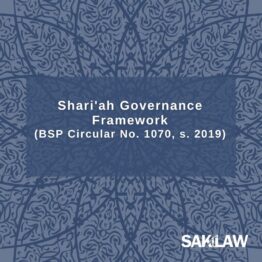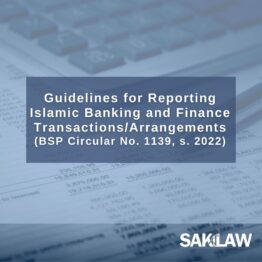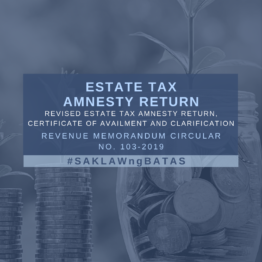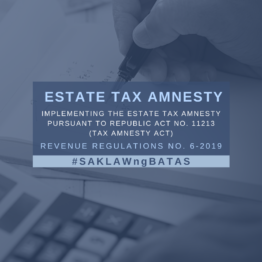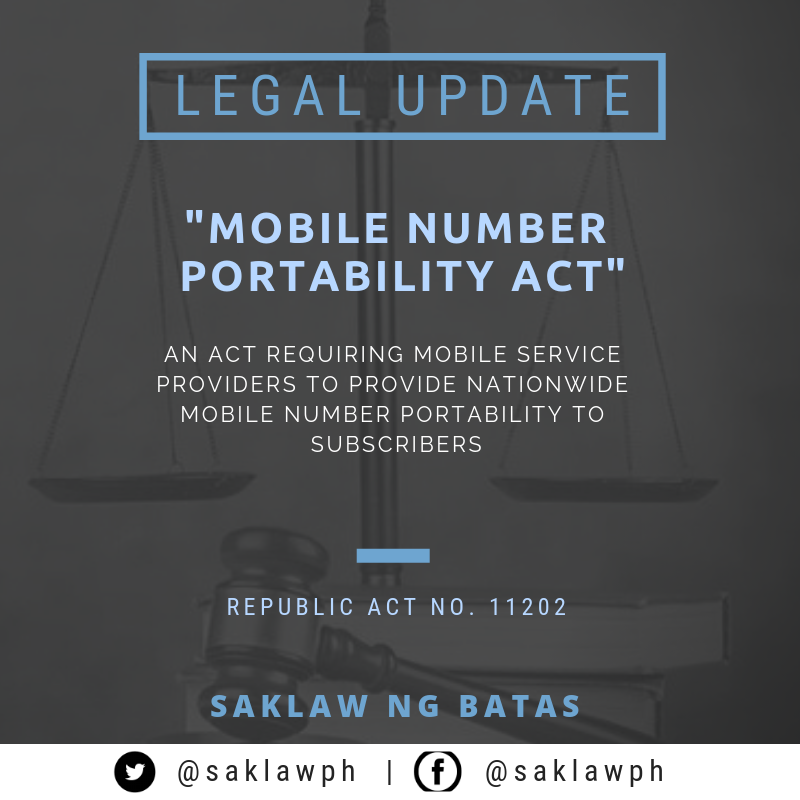
RA 11202
February 8, 2019
REPUBLIC ACT NO. 11202
AN ACT REQUIRING MOBILE SERVICE PROVIDERS TO PROVIDE NATIONWIDE MOBILE NUMBER PORTABILITY TO SUBSCRIBERS
SECTION 1. Short Title. — This Act shall be known as the “Mobile Number Portability Act.”
SECTION 2. Declaration of Policy. — It is the declared policy of the State to recognize the primary role of the private sector as an engine of economic growth and to guarantee the right of individuals and private entities to own, establish, and operate economic enterprises. The Constitution provides that the use of property bears a social function where all economic agents shall contribute to the common good. The right of private entities is therefore subject to the duty of the State to intervene when the common good so requires, including the duty to regulate the acquisition, ownership, use, and disposition of private property through the prohibition of monopolies and combinations in restraint of trade or unfair competition.
SECTION 3. Guiding Principles for Implementation. — The following shall serve as guiding principles in the implementation of this Act:
(a) The basic premise behind a nationwide Mobile Number Portability system is to promote consumer welfare as it fosters the freedom to choose and to respond to quality, price, and other relevant considerations without the consumers having to change their mobile numbers whenever they change mobile service providers or subscription plans.
(b) Mobile Number Portability is envisioned to encourage mobile service providers, whether a public telecommunications entity or a virtual network operator, to compete with each other to provide consumers with the best overall value that they can offer, thus encouraging technological innovation that will stimulate even greater demand for telecommunications products and services and lead to a virtuous cycle of economic growth.
(c) Mobile Number Portability represents an opportunity to rebalance the relationship between mobile service providers and consumers in a vibrant economy and a well-served consumer sector.
SECTION 4. Definition of Terms. — As used in this Act:
(a) Cutover Period refers to the date and time when a subscriber who submitted a porting application will have no mobile telecommunications service while the porting process is being completed;
(b) Donor Provider refers to the mobile service provider to whose network the mobile number belongs at the time the subscriber submits a porting application;
(c) Mobile Number refers to the number series assigned by a mobile service provider to its subscribers;
(d) Mobile Number Portability or MNP refers to the ability of a mobile postpaid or prepaid subscriber, who has no existing financial obligation to the donor provider, to retain an existing mobile number despite having moved from one (1) mobile service provider to another, or to change the type of subscription from postpaid to prepaid or vice versa;
(e) Mobile Postpaid Subscriber refers to any person, natural or juridical, who avails of the mobile telecommunications service under a prior arrangement with a mobile service provider. The subscriber is billed after the fact, according to the use of mobile telecommunications services at the end of the monthly billing cycle;
(f) Mobile Prepaid Subscriber refers to any person, natural or juridical, who avails of the mobile telecommunications service from a mobile service provider by purchasing credit in advance of service use. The purchased credit is used to pay for mobile telecommunications services at the point the service is accessed or consumed;
(g) Mobile Service Provider refers to a public telecommunications entity or a virtual network operator, or any entity that provides mobile telecommunications service to subscribers;
(h) Porting Application refers to an application submitted by a subscriber to a mobile service provider to avail of MNP;
(i) Porting Process refers to the process by which a donor provider moves a mobile number to a recipient provider or changes the type of subscription from postpaid to prepaid or vice versa. In no case shall the entire porting process take more than forty-eight (48) hours;
(j) Public Telecommunications Entity or PTE refers to any duly authorized public telecommunications entity that offers voice, short messaging system (SMS or text), mobile data, value-added services (VAS), or any other mobile telecommunications services to the public for a fee;
(k) Recipient Provider refers to the mobile service provider that shall provide mobile telecommunications service to the subscriber after the porting process;
(l) Subscriber refers to any person, natural or juridical, who avails of mobile telecommunications service from a mobile service provider; and
(m) Virtual Network Operator or VNO refers to an entity that offers telecommunications service to the public under its own brand, but utilizes the network of another authorized PTE.
SECTION 5. Interpretation. — Any doubt in the interpretation of any provision of this Act and its implementing rules and regulations (IRR) shall be liberally interpreted in a manner mindful of the rights and interests of the subscriber availing of MNP.
SECTION 6. Obligation of Public Telecommunications Entities (PTE). — It shall be the obligation of every PTE to:
(a) Provide nationwide MNP to all qualified subscribers completely free of charge. In no case, under penalty of law as provided hereunder, shall the benefits of MNP to a subscriber who has decided to avail of MNP be delayed, withheld, refused, or otherwise not delivered within the period provided under this Act: Provided, That a PTE shall change the type of subscription from postpaid to prepaid or vice versa, within twenty-four (24) hours from the time a subscriber submits the porting application:Provided, further, That the number porting process for postpaid subscribers is separate from the approval process for a new mobile subscription plan from the recipient provider: Provided, finally, That a subscriber shall be allowed to port the same number only after the lapse of sixty (60) days from the completion of the last porting process;
(b) Set up a mechanism for the implementation of MNP. It shall interconnect directly or indirectly with the infrastructure, facilities, systems, or equipment of other PTEs and not install network features, functions or capabilities that will impede the implementation of the nationwide MNP system;
(c) Unlock upon demand and completely free of charge the mobile telephone handset of a subscriber who has requested and has complied with all the requirements for MNP;
(d) Facilitate the number porting process of VNOs that it is hosting in its network, in case a subscriber of such entities decides to avail of MNP, and upon the receipt of the application from the VNOs;
(e) Provide subscribers complete, relevant, and timely information on MNP including its features, the porting application requirements, the porting process, and the cutover period in the porting process;
(f) Maintain confidentiality of information obtained by not monitoring or disclosing the contents of any usage transaction contained within the databases under its control, except to the extent necessary to comply with the provisions of this Act; and
(g) Adhere to the provisions of Republic Act No. 10173, otherwise known as the “Data Privacy Act of 2012,” its IRR, and issuances of the National Privacy Commission in the processing or handling of the subscribers’ personal data, and provide the necessary safeguards to protect the same in the course of porting activities.
SECTION 7. Obligation of the Recipient Provider. — Upon receipt of the MNP application, the recipient provider shall transmit the same to the donor provider for the purpose of clearing the mobile number for porting. It shall activate the subscriber’s ported number under its network within twenty-four (24) hours upon notification that the mobile number has been cleared for porting. If the recipient provider is a VNO, it will first transmit the MNP application to its host PTE, who shall then proceed with carrying out the porting process. The VNO shall be responsible for any interaction with its subscriber and the donor provider for the duration of the porting process. The porting process shall be deemed complete upon the activation of the mobile number under the network of the recipient provider.
SECTION 8. Obligation of the Donor Provider. — It shall be the obligation of every donor provider to:
(a) Within twenty-four (24) hours upon receipt of the porting application:
(1) Transmit the notice of clearance to the recipient provider: Provided, That the mobile number to be ported does not have any existing financial obligation with the donor provider. In the case of a VNO, it shall first acquire clearance from its host PTE before transmitting the notice of clearance to the recipient provider; or
(2) Notify the subscriber and the recipient provider that the mobile number to be ported has an existing financial obligation with the donor provider. It shall give the subscriber a period of three (3) working days upon receipt of the notice to settle the outstanding obligation. Upon full payment, the donor provider shall comply with paragraph (1) hereof. It shall notify the recipient provider in case of nonpayment after the lapse of the three (3)-day period.
(b) Continue to provide all mobile telecommunications services to the subscriber of the mobile number being ported, subject to a cutover period, the allowable duration of which shall not exceed four (4) hours and made known to the subscriber upon submission of the porting application; and
(c) Not to impose conditions and procedures for contract termination or for completion of a porting application which have the effect of serving as a disincentive or deterrent against moving to a different mobile service provider. It shall not use the information obtained from porting activities to persuade the subscriber to cancel or to delay a porting application.
SECTION 9. Non-Imposition of Interconnection Fee or Charge. — Consistent with the basic premise of this legislation to promote consumer welfare by fostering freedom of choice, no interconnection fee or charge shall be imposed by any mobile service provider for domestic calls and SMS made by a subscriber after the effectivity of this Act.
SECTION 10. Administrative Fines and Penalties. — The National Telecommunications Commission (NTC) is hereby authorized to impose the following fines for violations of this Act:
(a) A fine of Ten thousand pesos (P10,000.00) where portability is not performed within the periods allowed under this Act, but delivered by the mobile service provider on or before the complaint under Section 11 hereof is filed, or delivered after and in accordance with agreements arrived at in mediation under Section 11 hereof.
(b) A fine of not less than Forty thousand pesos (P40,000.00) where MNP is unjustly refused even after mediation.
(c) A fine of not less than One hundred thousand pesos (P100,000.00) up to Three hundred thousand pesos (P300,000.00) for the second to the fourth instance where MNP is unjustly refused even after mediation.
(d) A fine of not less than Four hundred thousand pesos (P400,000.00) up to One million pesos (P1,000.000.00) and revocation of the PTE’s franchise to operate for the fifth and subsequent instances if MNP is unjustly refused even after mediation.
In case the mobile service provider is a VNO, and it is proven that it failed to comply with any of its obligations, including delay in the transmission of a porting application to its host PTE or unjust refusal to process an MNP application from its subscribers, the same penalties shall apply. In case it is proven that the host PTE delayed or unjustly refused to process a porting application transmitted by a VNO, the host PTE shall be solidarily liable for such offense and the same penalties shall apply.
The NTC is also hereby authorized to award the subscriber damages not to exceed Forty thousand pesos (P40,000.00). The NTC shall impose and collect the appropriate fines from the mobile service providers who are in violation of this Act. The amount to be collected from the fines shall be remitted to the National Treasury.
SECTION 11. Implementing Rules and Regulations (IRR). — Within ninety (90) days from the effectivity of this Act, the NTC, as the government entity mandated to implement nationwide MNP, shall coordinate with the Department of Information and Communications Technology, the National Privacy Commission, the Philippine Competition Commission, and other concerned agencies, and promulgate rules and regulations and other issuances as may be necessary to ensure the effective implementation of this Act.
Within six (6) months from the promulgation of the rules and regulations, mobile service providers shall comply with the provisions of this Act and set up a mechanism for the purpose of implementing nationwide MNP.
The rules and regulations shall provide an expeditious framework to govern all relevant aspects of MNP including, but not limited to, the following factors: (a) the most appropriate, efficient, and cost-effective porting scheme to be adopted; (b) the specific rights and obligations of subscribers, the donor and recipient providers, and other parties to the porting process; (c) the coordinated procedure to be followed by each party in processing a mobile number porting application, including a scheme for porting notifications as may be required and the specific time limits given to every party to complete the required steps in the entire porting process which process shall, in no case, exceed forty-eight (48) hours; and (d) the measures to ensure the least amount of disruption of service to the consumer when implementing MNP.
The rules and regulations shall also prescribe a mediation procedure before the one-stop shop of the NTC to accept customer complaints of denied or delayed MNP, where the NTC may mediate between subscribers and mobile service providers to facilitate MNP and where the NTC may, after granting both parties due process, resolve to either compel or deny MNP.
SECTION 12. Separability Clause. — If any provision of this Act is held invalid or unconstitutional, the other provisions not affected thereby shall remain in full force and effect.
SECTION 13. Repealing Clause. — All laws, decrees, executive orders, proclamations, rules and regulations, and issuances or parts thereof which are inconsistent with the provisions of this Act, are hereby repealed, amended or modified accordingly.
SECTION 14. Effectivity. — This Act shall take effect fifteen (15) days after its publication in the Official Gazette or in any newspaper of general circulation.
Approved: February 8, 2019.
https://www.officialgazette.gov.ph/2019/02/08/republic-act-no-11202/

